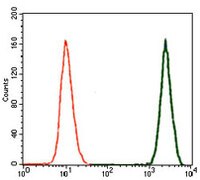Molecular targets of chromatin repressive mark H3K9me3 in primate progenitor cells within adult neurogenic niches.
Foret, MR; Sandstrom, RS; Rhodes, CT; Wang, Y; Berger, MS; Lin, CH
Frontiers in genetics
5
252
2014
Show Abstract
Histone 3 Lysine 9 (H3K9) methylation is known to be associated with pericentric heterochromatin and important in genomic stability. In this study, we show that trimethylation at H3K9 (H3K9me3) is enriched in an adult neural stem cell niche- the subventricular zone (SVZ) on the walls of the lateral ventricle in both rodent and non-human primate baboon brain. Previous studies have shown that there is significant correlation between baboon and human regarding genomic similarity and brain structure, suggesting that findings in baboon are relevant to human. To understand the function of H3K9me3 in this adult neurogenic niche, we performed genome-wide analyses using ChIP-Seq (chromatin immunoprecipitation and deep-sequencing) and RNA-Seq for in vivo SVZ cells purified from baboon brain. Through integrated analyses of ChIP-Seq and RNA-Seq, we found that H3K9me3-enriched genes associated with cellular maintenance, post-transcriptional and translational modifications, signaling pathways, and DNA replication are expressed, while genes involved in axon/neuron, hepatic stellate cell, or immune-response activation are not expressed. As neurogenesis progresses in the adult SVZ, cell fate restriction is essential to direct proper lineage commitment. Our findings highlight that H3K9me3 repression in undifferentiated SVZ cells is engaged in the maintenance of cell type integrity, implicating a role for H3K9me3 as an epigenetic mechanism to control cell fate transition within this adult germinal niche. | Fluorescence Activated Cell Sorting (FACS) | 25126093
 |
Epigenetic regulation by chromatin activation mark H3K4me3 in primate progenitor cells within adult neurogenic niche.
Sandstrom, RS; Foret, MR; Grow, DA; Haugen, E; Rhodes, CT; Cardona, AE; Phelix, CF; Wang, Y; Berger, MS; Lin, CH
Scientific reports
4
5371
2014
Show Abstract
Histone 3 lysine 4 trimethylation (H3K4me3) is known to be associated with transcriptionally active or poised genes and required for postnatal neurogenesis within the subventricular zone (SVZ) in the rodent model. Previous comparisons have shown significant correlation between baboon (Papio anubis) and human brain. In this study, we demonstrate that chromatin activation mark H3K4me3 is present in undifferentiated progenitor cells within the SVZ of adult baboon brain. To identify the targets and regulatory role of H3K4me3 within the baboon SVZ, we developed a technique to purify undifferentiated SVZ cells while preserving the endogenous nature without introducing culture artifact to maintain the in vivo chromatin state for genome-wide studies (ChIP-Seq and RNA-Seq). Overall, H3K4me3 is significantly enriched for genes involved in cell cycle, metabolism, protein synthesis, signaling pathways, and cancer mechanisms. Additionally, we found elevated levels of H3K4me3 in the MRI-classified SVZ-associated Glioblastoma Multiforme (GBM), which has a transcriptional profile that reflects the H3K4me3 modifications in the undifferentiated progenitor cells of the baboon SVZ. Our findings highlight the importance of H3K4me3 in coordinating distinct networks and pathways for life-long neurogenesis, and suggest that subtypes of GBM could occur, at least in part, due to aberrant H3K4me3 epigenetic regulation. | | 24947819
 |












